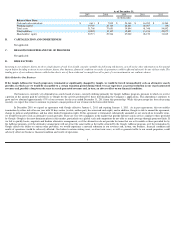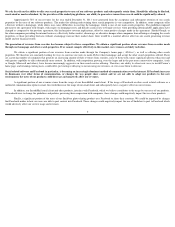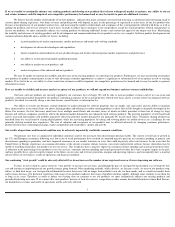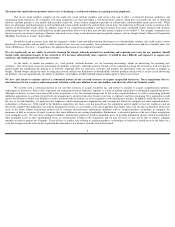Incredimail 2011 Annual Report Download - page 18
Download and view the complete annual report
Please find page 18 of the 2011 Incredimail annual report below. You can navigate through the pages in the report by either clicking on the pages listed below, or by using the keyword search tool below to find specific information within the annual report.
There is currently also uncertainty in relation to the passing of relatively recent online laws. For example, legislation has been enacted to regulate the use of
"cookie" technology. In Europe there is a patchwork of implementation and limit guidance as to what good practice looks like. Further, some Member States are yet to
implement the relevant Directive and bring their laws into compliance. Upon installation of our software, certain cookies generated by us and our advertisers are
placed on our customers’
computers. It has been argued that Internet protocol addresses and cookies are intrinsically personally identifiable information that is subject
to privacy standards. We cannot assure you that our current policies and procedures would meet these restrictive standards.
In addition, technology is changing constantly and data security regulations and standards are in a state of flux. Changes in law or regulations may require
that we materially change the way we do business. For example, we may be required to implement physical, administrative and technological security measures
different from those we have now, such as different data access controls or encryption technology. We may incur substantial expenses in implementing such security
measures.
Although current decisions of the U.S. Supreme Court restrict the imposition of obligations to collect state and local sales and use taxes with respect to sales
made over the Internet, the U.S. Congress and a number of states have been considering or have adopted various initiatives that could limit or supersede these
decisions. If any of these initiatives result in a reversal of the Court’
s current position, we could be required to collect sales and use taxes on our U.S. sales. The
imposition by state and local governments of various taxes upon Internet commerce could create administrative burdens for us and could decrease our future sales.
The EU has already enacted legislation regarding Value Added Tax imposed on certain software sold by companies outside the EU to consumers in the EU
over the Internet. This legislation could be interpreted to include other parts of the Company’
s business not yet accrued for by the Company, causing additional
significant tax exposure, or alternatively, reduce the competitiveness of the Company’s pricing of its products.
The cost of compliance with the world taxation, consumer data protection and privacy related laws and regulations could be material and we may not be able
to comply with the applicable regulations in a timely or cost-
effective manner. In response to evolving legal requirements, we may be compelled to change our
business model and practices, which could reduce our sales, and we may not be able to replace the revenues lost as a consequence of the change. These changes could
also require us to incur significant expenses, subject us to liability and require increased time and attention of our management. See "Item 4.B Business Overview —
Government Regulation" for additional discussion of applicable regulations affecting our Company.
Risks Related to Our Operations in Israel
Political, economic and military instability in the Middle East may impede our ability to operate and harm our financial results.
Our principal executive offices are located in Israel. Accordingly, political, economic and military conditions in the Middle East may affect our business
directly. Since the establishment of the State of Israel in 1948, a number of armed conflicts have occurred between Israel and its Arab neighbors. During the winter of
2008, Israel was engaged in an armed conflict with Hamas, a militia group and political party operating in the Gaza Strip, and during the summer of 2006, Israel was
engaged in an armed conflict with Hezbollah, a Lebanese Islamist Shiite militia group and political party. Since February 2011, Egypt has experienced political
turbulence, following the resignation of Hosni Mubarak as president, including protests throughout Egypt, and the appointment of a military regime in his stead
followed by the election to the Egyptian parliament of certain political parties which advocate breaking ties with Israel, which may damage the current peaceful and
diplomatic relations between Israel and Egypt, and which could affect the region as a whole. Similar civil unrest and political turbulence has occurred in other
countries in the region and is affecting the political stability of those countries. Syria, which borders Israel, has experienced months of violence and some have
expressed concern that the unrest could spill into Israel or lead to incidents on what has been a relatively quiet border in recent years. This instability may lead to
deterioration of the political and economic relationships that exist between the State of Israel and some of these countries. In addition, Iran has threatened to attack
Israel and is widely believed to be developing nuclear weapons. Iran is also believed to have a strong influence among extremist groups in the region, such as Hamas
in Gaza and Hezbollah in Lebanon. These situations may potentially escalate in the future to more violent events which may affect Israel and us. These situations,
including conflicts which involved missile strikes against civilian targets in various parts of Israel, negatively affected business conditions in Israel. Any hostilities
involving Israel or the interruption or curtailment of trade between Israel and its present trading partners could have a material adverse effect on our business,
operating results and financial condition. While such hostilities did not in the past have a material adverse impact on our business, we cannot guarantee that hostilities
will not be renewed and have such an effect in the future. Ongoing and revived hostilities and the attempts to resolve the conflict between Israel and its Arab neighbors
often results in political instability that affects the Israeli capital markets and can cause volatility in interest rates, exchange rates and stock market quotes. The political
and security situation in Israel may result in parties with whom we have contracts claiming that they are not obligated to perform their commitments under those
agreements pursuant to force majeure provisions. These or other Israeli political or economic factors could harm our operations and product development and cause
our sales to decrease. Any hostilities involving Israel or the interruption or curtailment of trade between Israel and its present trading partners could adversely affect
our operations and could make it more difficult for us to raise capital. Furthermore, several countries, principally those in the Middle East, still restrict business with
Israel and Israeli companies and, although the impact of these restrictions is not as important for a company such as ours that sells its products through the Internet, it
may nevertheless have an adverse effect on our results of operations. Since many of our facilities are located in Israel, we could experience serious disruptions if acts
associated with this conflict result in any serious damage to our facilities. Our business interruption insurance may not adequately compensate us for losses that may
occur and any losses or damages incurred by us could have a material adverse effect on our business. Any future armed conflicts or political instability in the region
would likely negatively affect business conditions and harm our results of operations.
15
























